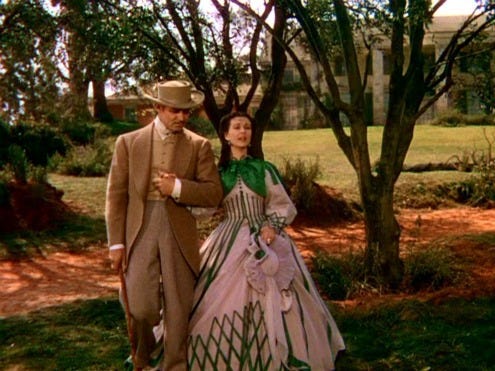And the Nominees Were — 1939

Austin Lugar, Keith Jackson and Kenny Jones started a podcast called "And the Nominees Are." On this show they are attempting to review every single Best Picture nominee starting from the very beginning. Here, Austin recaps the plot summaries of each set while teasing the longer discussions.
In the history of the Oscars, there are a few years that stand out as really incredible. 1977 had "All the President's Men," "Bound for Glory," "Network" and "Taxi Driver" all losing to "Rocky," another beloved movie. 1939 is another of those years with so many films that are still watched today, especially by families. It’s almost unfair that some of these happened to come out in the same year because they could have easily won the gold among a weaker field.
"Dark Victory"
Just like Norma Shearer kept popping up in the earliest years, it’s expected to see Bette Davis every time. More likely than not, she gets a big sweeping “Oscar scene.” This is another movie to showcase her range as she plays a woman who is dying but may have gotten better. The melodrama is sometimes a bit much, but an interesting plot keeps it going.
"Gone with the Wind" – WINNER
What can’t be said about this movie? Its epicness still feels underplayed. It’s obviously a technical masterpiece as it pulls off the most impressive elements from the Margaret Mitchell book, such as when the mansion burns. Yet it really holds up well because all of the performances are grounded and the writing is really strong. Deserving of all its praise.
"Goodbye, Mr. Chips"
This one is not deserving of all its praise. It’s the go-to “inspirational teacher movie,” but it does not hold up well. Everyone is too cheesy, and the writing is devoid of any emotional connections between the characters. Too many moments aren’t earned, especially the way they raise up Mr. Chips into a messiah-esque teacher, yet Robert Donat still won Best Actor and it’s constantly referenced today.
"Love Affair"
Leo McCarey was rather consistent director at this time. He’d made some incredible movies, but this one is lesser in comparison. It’s his first version of "An Affair to Remember" with two actors who lack the spark of Cary Grant and Deborah Kerr. Still there is plenty of charm, especially the couple’s first day together.
"Mr. Smith Goes to Washington"
Without this movie, nobody would know what a filibuster is. C-SPAN is never as dramatic as this movie, but that’s what Frank Capra does best. He shows the hopeful world we wish we inhabited. Jimmy Stewart is, of course, brilliant as the young senator who wants to make a difference. The film is so earnest that it is still inspiring and worth showing to children.
"Ninotchka"
It’s been awhile, but Ernst Lubitsch is back with this one, known primarily because of how it used Greta Garbo. Instead of her moody uber-serious persona, she was allowed to be funny. Most of the humor comes from her being an extremely robotic Communist sent from Russia to disprove capitalis — and take part in a fun convoluted plot. Not as many laughs per minute as his other work, but this still a delightful movie.
"Of Mice and Men"
Most people have just seen the Gary Sinise version, but this one holds up as a solid equal. Adapted from the famed John Steinbeck novella, Burgess Meredith and Lon Chaney Jr. play the two brothers traveling from ranch to ranch to find jobs. Sometimes it’s overplayed but not too often. They establish a great tone and even keep with the grittiness of the source material.
"Stagecoach"
Orson Welles said he watched this movie 100 times to teach him everything he needed to know about filmmaking so he could produce "Citizen Kane." It’s evident why. This is the John Ford we know and love. He uses Monument Valley with automatic expertise to film thrilling chases and landscape shots. Strangers are forced to know each other better as their stagecoach ride is full of danger, including the arrival of the Ringo Kid, played by John Wayne. Fantastic stuff.
"The Wizard of Oz"
It’s the bloody "Wizard of Oz." Any faults you have with this film are minimized compared to it being "The Wizard of Oz." It’s the ultimate family film due to the classic songs, beautiful surroundings and romantic quest. It’s scary, silly and has a likable message. Seriously, it’s "The Wizard of Oz."
"Wuthering Heights"
Here marks the first, but not final, appearance of Laurence Olivier. He plays the brooding Heathcliff, doomed to take part in one of the most famous Gothic romances of all time. Not everything works in this adaptation, but there are plenty of acting gems throughout and keen direction by William Wyler
We discuss these movies in a lot more detail on our show, "And the Nominees Are," as well as discussing the other awards from this year. This set was covered over two episodes, both of which can be found for free on iTunes. We’d love it if you left us a review! Our show is also on Facebook and Twitter and our brand-new website.
If you’d like to play along with us, the next 10 films for 1940 are "All This and Heaven Too," "Foreign Correspondent," "The Grapes of Wrath," "The Great Dictator," "Kitty Foyle," "The Letter," "The Long Voyage Home," "Our Town," "The Philadelphia Story" and "Rebecca."


